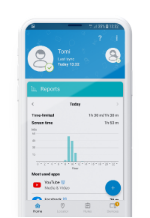The Covid-19 pandemic has forced most parents to work from home, which has its pluses and minuses.
But working from home over the long-term means filling four roles at the same time:
- Your ‘day job’
- Teacher
- Parent
- Cleaner

That’s very different from the normal work-life balance and could be a path to burnout. If you're in this situation, you’re a superhero and you deserve some appreciation.
 Together with the child psychologist PhDr. Jarmila Tomková, we asked ESET employees with children about the problems they face and how they cope.
Together with the child psychologist PhDr. Jarmila Tomková, we asked ESET employees with children about the problems they face and how they cope.

Liza, an amateur teacher (one daughter):
“Teaching children at home is normally something that a family chooses after a careful consideration of all circumstances. As we didn’t choose it, we’re not ready for it in terms of logistics and skills, and we don’t have the time either. The assigned tasks require non-stop parental assistance, which means I end up working in the evenings and nights. This makes me completely exhausted, sleepless and nervous. This is stressful. It results in me not being as nice and attentive to my daughter as I would like. I see that when I'm working, she's bored or spends too much time in front of the TV. I’m not at all satisfied with this kind of parenting.”
What helps me:
“We divide the day into individual time slots that we assign to specific activities. It’s important to remember that everyone should have their own space and time, including me. Together with my daughter, we exercise at home whenever we can. At the weekend, we enjoy board games and I get some much-needed sleep.”

David, a part-time cleaner (three children):
“I can’t concentrate on the work that needs my full attention, which is very stressful, especially with deadlines. My smallest daughter is of an age when she requires a lot of attention. My son fights all the time with his older sister, so their arguments can be heard from everywhere. Apart from that, I end up doing more housework now, which isn’t necessarily a bad thing as it now balances my work and family time.”
What helps me:
“What helps us to cope with this situation is learning to compromise. It’s important to divide the day between full concentration on work and time when I can handle being disturbed – for example, when I’m answering emails. The fact that I’m now doing more housework not only lets my wife have more time for herself, but also improves the family atmosphere overall. I use my free time for going out for walks or going for walks or doing exercise. In addition, I play computer games or in the evening I have a beer with friends via Skype.”

William, creative entertainer / trainer (two children):
“Working from home while taking care of two children means being constantly disturbed. It's really hard – we’re all exhausted. The more bored our children are, the more annoyed we are. Our number one goal is clear: have the kids entertained as much as possible.”
What helps me:
“Mutual support between my wife and me is essential, while using the time with children in the most fun and creative way. A one-and-a-half-year age difference fortunately allows them to do things together. I also take a break during my work hours to workout with the kids. For them it's like PE at school, and to me it brings sanity. We also workout together in the evening. Otherwise we do anything to make the day a little bit more special and find time for ourselves. We also talk a lot with the children about the current situation and explain to them what’s going on.”

Barbara, reluctant chef (two sons):
“What bothers me the most these days is the constant cooking and food preparation for the four of us. I cook twice a day, every day. Someone is always hungry!”
What helps me:
“To avoid going crazy, we set clear rules and a daily routine. After all, the children can’t just watch TV all day. They have now learned to accept this fact. What seems to help them is to have a properly structured day. Before lunch they have morning chores, then TV until 4pm. Their time on the internet and mobile devices is limited to one hour between 7pm and 8pm (a rule we enforced using ESET Parental Control a long time before the quarantine).
However, we also had to agree on some rules for the adults in the family. Everyone, whether family or friends, now seems to want to socialize a lot over Skype. It’s nice, but I definitely can’t do it during working hours! On top of it all, my whole body hurts from cooking, so I try to exercise at least every other day – this helps to reduce pain and anxiety. Then the weekend arrives, and we welcome it with open arms, like a reward.”

Although there are many benefits that parents at ESET have discovered during this situation, having the family constantly under one roof also brings many struggles. Of all the additional roles that parents have taken on, the main one is project manager. Think of it as creating your own TV series called ‘Our House’. These are child psychologist PhDr. Jarmila Tomková’s top seven tips:
-
TEAMWORK AND PROJECT MANAGEMENT You need to establish a project plan, coordinate its course, lead the participants, expect variations right from the beginning and be aware of the pitfalls and how to deal with them. Do it sensibly and realistically. Take your experiences so far as the first series of ‘Our House’ – showing the critical points of what you are doing and what works best. Use the experience to create a clear project plan for the coming weeks. There isn’t one universal plan for every family, so you’ll have to customize one for yourselves – it’s important to have one. At the very least, parents need to be synchronized and supportive of each other. Your TV series should be more ‘Full House’ than ‘Breaking Bad’.
-
CLEAR RULES AND ROUTINE Whether the family has one or more children, it’s always useful to determine clear rules. Give them a routine so that the day runs more smoothly and everyone has something to follow. Make the plan as detailed as possible. This includes the morning routine, time for video learning, work, lunch breaks, TV time and games, internet, online socializing and ‘me time”. Make rules for the children and the parents.
-
CHILDREN AS PROJECT CO-CREATORS – LET EVERYONE BE PART OF THE SHOW While the parents need to prepare the framework for the rules, they should give the children a chance to contribute in their own way. That way everyone has a commitment to the plan and knowledge that they’re part of a team. Everyone can contribute something. This could include postponing their needs until later, helping at home, looking after younger siblings or not disturbing important video calls. In this way, the suggestions of the children can help to make it easier for everyone to adapt to the conditions, to follow the rules and to decide what any penalties and consequences will be if the rules aren’t followed.
-
BE A GOOD BOSS Appreciate the qualities in other people that contribute to good cooperation.
-
MAINTAINING RELATIONS AND FRIENDSHIPS Don’t forget to socialize virtually with your extended family and your friends, either jointly or individually. The feeling that friendship and good relations are not at risk is important to maintain a sense of security, especially for children.
-
BE PROACTIVE TOGETHER IN MANAGING THE PANDEMIC Talk about the quarantine situation, the nature of the crisis in society and the reasons for the limitations that follow. Develop compassion for children and empathy for those who suffer and those who are helping. Explain why adults help seniors and so on. Help your children in small and friendly ways, such as writing letters or messages to their friends and placing them in the front garden or on the window.
-
KINDNESS INSTEAD OF SELF-CRITICISM Parents need to enforce the rules – it’s a big challenge and it’s not possible to succeed 100%. So be less strict on yourselves because in these changed conditions it’s hard to be successful in all the roles we would like. It just isn’t possible now. The fact that you are getting through things day by day as best as you can is a success on its own!
We know these are difficult times and it might be the first time many people have considered digital security. We’d like to help and have therefore extended the 30-day trial of ESET Internet Security to 90 days. That’s three months of protection, absolutely free.
Home office, home-schooling, home-entertaining... Check out the tips from ESET security expert Jake Moore:


